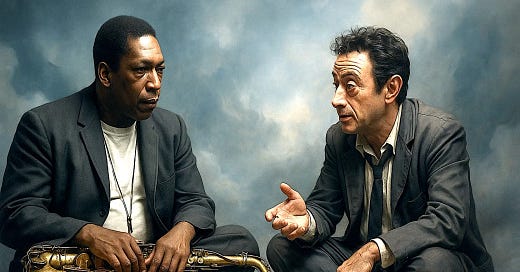John Coltrane Meets Lenny Bruce in the Afterlife
Improvisations on Freedom, Laughter, and the Afterlife
Welcome to the Bardo
The Bardo.
That haunted in-between, where the soul unhooks from the body but hasn’t yet latched on to what comes next.
No clocks. No rules. No exits.
Only memory, music, and the mess you left behind.
First Contact
“Jesus Christ—what is this, the afterlife or therapy for overachievers?”
The voice cut through the stillness like a heckle in a cathedral.
John Coltrane looked up from his seated meditation, the shape of his saxophone forming slowly across his knees—not as brass, but as memory. His fingers danced over keys not yet present, already searching for a sound that didn’t need air.
Twenty feet away, Lenny Bruce flickered into coherence—rumpled, wiry, raw. His eyes were too sharp for this place. His suit still carried the static of every stage he’d been thrown off.
“You’re Lenny Bruce,” Coltrane said—not as a question, but as recognition.
“And you’re Saint Trane of the Sacred Chord. I died from overexposure to truth. You overdosed on transcendence. Here we are.”
Coltrane nodded, almost smiling. “Different medium. Same obsession.”
Recognition
Later—though time bent like tone in the Bardo—they sat again. Lenny had a phantom cigarette in his fingers, flicking ashes that never hit the ground.
“You ever feel like we were wired wrong?” Lenny said. “Most people chase comfort. We chased the void.”
“I chased the divine,” Coltrane replied. “The void came later.”
Lenny barked a laugh. “And I chased the lie until it screamed. What did it get us? I died shaking in a bathroom. You died burned out from reaching too high.”
“I practiced until I couldn’t stand. Alice would find me collapsed, still fingering ghost notes. But I couldn’t stop. The music… it kept calling.”
Lenny nodded. “I couldn’t let a bit end if it wasn’t sharp enough to draw blood. Soon as they laughed too easily, I twisted the knife. I needed them awake.”
The Bardo shimmered, revealing glimpses: Coltrane’s hours alone, mouthpiece soaked with sweat and spit. Lenny in court, pacing before judges who never understood that the filth in his jokes was just a mirror.
“You ever think we were addicts?” Lenny asked. “Not to junk. To revelation.”
Coltrane took a long breath he didn’t need. “Absolutely.”
The Larger Conversation
“Some of us were listening.”
Nina Simone appeared like a chord change—unexpected, inevitable. Her walk was deliberate. Her gaze landed like thunder.
“You weren’t alone,” she said, settling next to them. “We heard what you were trying to do. We just didn’t always survive it.”
Coltrane’s saxophone lifted. Nina didn’t sing. She didn’t need to. Her presence was music—dissonant, necessary, unforgettable.
“You know the hardest part?” she said. “Not the audience. Not the critics. It was knowing what we gave up to stay true.”
“I lost gigs, lost cities,” Lenny muttered. “Didn’t even get a martyr’s sendoff. Just a punchline in a police report.”
“I lost entire lifetimes trying not to scream,” Nina said.
Coltrane didn’t speak. He played. One aching tone, drawn from some deep place between sorrow and strength.
In the distance, Baldwin typed furiously at a desk made of verbs and veils. Pryor flickered on the horizon like a damaged star. These weren’t cameos. This was a choir.
The Deeper Truth
Miles Davis materialized in his usual way—cool as shadow. “Trane tried to play everything at once,” he said. “Didn’t know when to stop. Couldn’t just let the silence breathe.”
“And you,” he said to Lenny, “had to run your mouth until the walls cracked.”
“And you blew your horn like it was a scalpel,” Nina snapped. “We all bled for it. That’s the job.”
“The more they praised us,” Coltrane added, “the less they heard us.”
“But they carried it,” Nina said, her voice soft now. “They passed it on.”
And the Bardo revealed it—light, sound, memory—young musicians, comics, poets, teachers, rabble-rousers, prophets in street clothes. Some spoke with anger, some with grace, but all carried echoes of these voices.
The Eternal Performance
The scene shifted—no longer clouds or abstractions. A studio without walls. A session outside of time.
“You know what’s funny?” Lenny said. “I wasn’t trying to be funny. I was trying to tell the truth and sneak it past the guards.”
“I wasn’t trying to entertain,” Coltrane said. “I was trying to speak to God in a language he hadn’t heard yet.”
“And I was trying to warn people,” Nina said. “That the fire was already in the house.”
Coltrane played. Lenny riffed. Nina sang without words. Baldwin typed the rhythm. Miles blew one defiant blue note and vanished again.
Together, they weren’t improvising.
They were testifying.
Coda
“You know what we were?” Lenny said, staring into the nothing. “Messengers. Sacred fools. Sounding alarms in languages nobody wanted to understand.”
“And now?” Coltrane asked.
“Now we echo,” Nina said.
They watched their influence ripple outward—not fame, not legacy. Impact.
And as the music resumed—more groove than dirge, more heartbeat than hymn—they became one chord:
Raw.
Revealing.
Righteous.
And still playing.
._ _ _ _ _
Until we meet again, let your conscience be your guide.






A lovely fantasy world full of memories. One last blue note for Miles. Baldwin pecking away. Coltrain's sax like a scalpel. And Nina appearing like a chord change. Love that!
Bret, I'm enjoying the iconography you conjure. It's good to know not only the names of saints but the tones of jazz players. The solid blue bottom C on Trane's tenor, or Miles' dry-and-slightly spitty sound. these days I might lose the blindfold tests on the new guys but I've got the history and the sound-sculptures of the original jazz men in my soul.